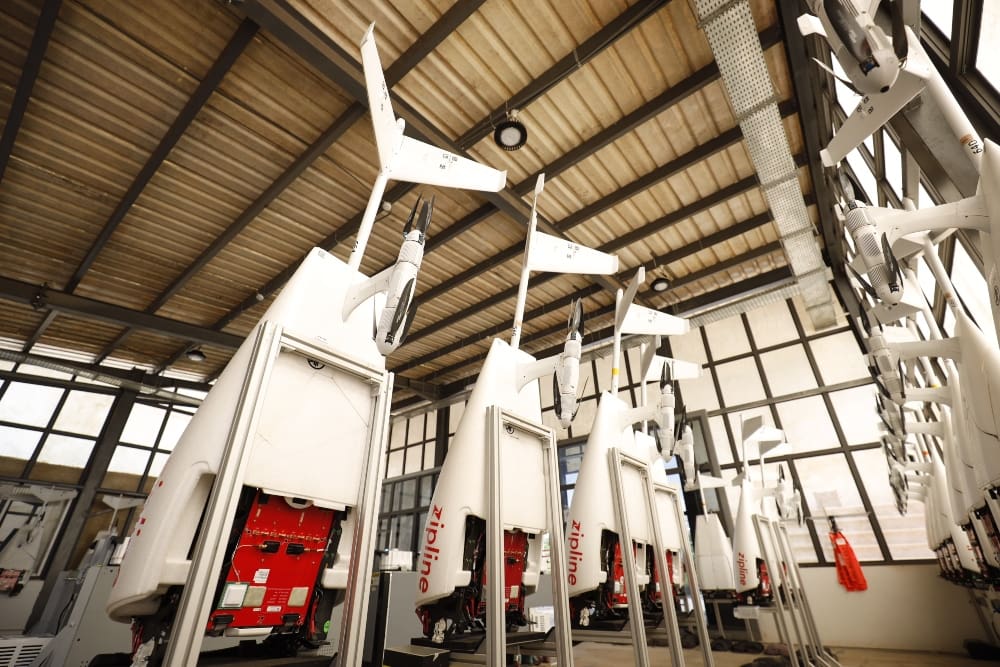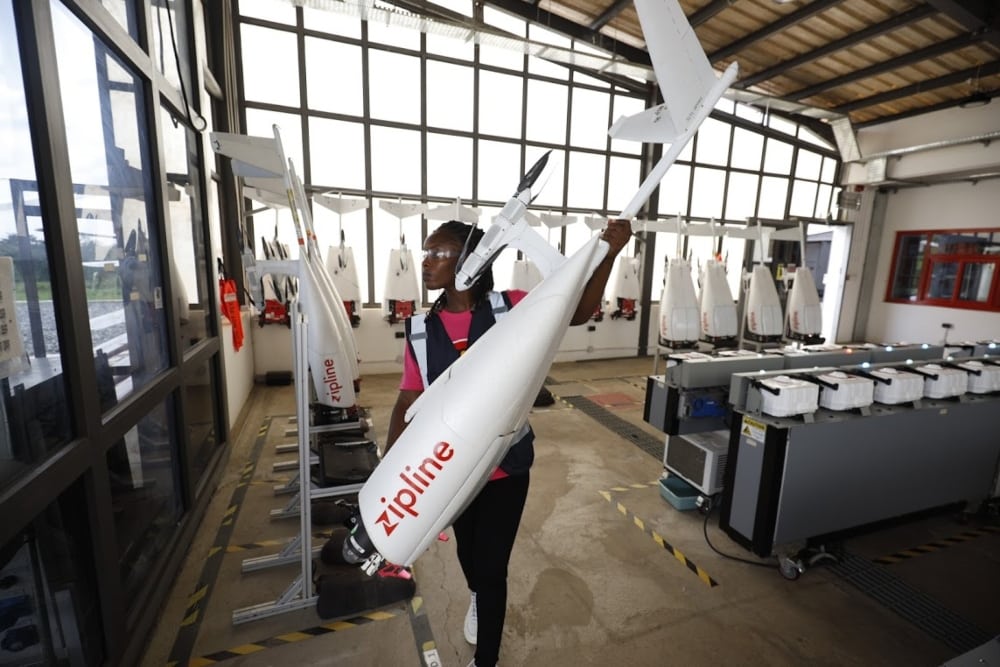Zipline Continues High-Growth Trajectory, Expanding Operations in U.S. and Africa While Doubling Its Valuation to $2.75 Billion
BY Zacc Dukowitz
7 July 2021While some drone delivery companies have spent time talking about what they could accomplish if U.S. regulations were to allow it, Zipline has steadily been pushing forward actual drone deliveries throughout the world.

Photo credit: Zipline
Zipline is a medical drone delivery company that uses drones to deliver blood, vaccines, platelets, plasma and cryoprecipitate.
The company has robust medical drone delivery networks in place in both Ghana and Rwanda. In the latter country, it supplies three quarters of the country’s national blood supply, and it has been building out similar networks in Nigeria, India, and the Philippines.
Zipline has also started making medical deliveries in the U.S. Last year it launched a program delivering PPE and medical equipment in North Carolina and announced a partnership with Walmart to test using drones for delivering health and wellness products to consumer’s homes.
Underscoring the need for its services, Zipline just raised $250 million in funding, bringing its total valuation up to a whopping $2.75 billion—a number that is pretty unheard of among drone startups. The money will be used to expand its work in Africa and the U.S.
Zipline’s Impressive Stats
Drone deliveries are still not that common, especially in the U.S.
While some drone delivery companies can claim they’ve conducted hundreds or even thousands of hours of tests, not many can make similar claims about the number of hours they’ve actually spent making deliveries.
Zipline is the exception. Since opening in 2014, the company has accomplished some impressive results:
- 15,000 lives saved in the last year due to its services.
- 25 million people currently served a year.
- 1,000 drones in daily use.
- 400,000 deliveries made in the last five years.
- 4 million miles flown in the last five years.
Although many companies suffered big losses during the pandemic, Zipline saw a huge uptick in medical drone deliveries.
In 2020, the company tripled its booking target for the year, as healthcare providers throughout the world scrambled to find ways to continue operations while supporting social distancing.
And its growth has continued to be spurred by the increased need for medical deliveries driven by the pandemic. In February of this year, Zipline announced plans to begin deliveries of both the Moderna and Pfizer COVID-19 vaccines, which required the development of a sophisticated cold-chain distribution system.
The company now says it plans to deliver 2.4 million vaccine doses by the end of 2021.
Instant Logistics, Not Just Drones
Zipline doesn’t think of itself as a drone company, but rather as an instant logistics provider.
This is a common perspective in the drone industry. Drone companies don’t want to be pigeonholed as a niche maker of cool robots, but as a provider of solutions for a specific problem.

Photo credit: Zipline
Instant logistics refers to being able to get things to people instantly—or very quickly, anyway.
Companies like Walmart and Amazon are already in heated delivery battles, investing in drones and autonomous cars so they can stay at the cutting edge of getting goods to their customers as quickly as possible.
Healthcare also has a big interest in instant logistics, especially as people become more and more accustomed to getting what they need without having to leave home.
[Hospitals] really see instant logistics as the other half of telepresence. If you can have someone quickly pull out their phone and talk to a doctor, then the other half of the equation is, can we get you what you need?
– Keller Rinaudo, CEO of Zipline
Zipline’s claim to being an instant logistics service is strong.
The company doesn’t just provide its clients with delivery drones–it also provides the logistics software, the launching and landing systems, and all of the expertise it has gathered from hundreds of thousands of medical delivery missions.
Beyond being an end-to-end solution, Zipline is vertically integrated, meaning that it makes every single thing that it uses in its work. This includes its drones, which it builds from the ground up without relying on outside sourcing for any of its components.
In the drone industry, this level of self-manufacturing is very rare. Most companies rely on foreign parts (primarily from China) for at least some part of their manufacturing process.
Over time Zipline has had to basically rip every single thing out of the system, whether it was the flight computer . . . or the battery pack, or the aircraft itself. And we’ve had to build every single one of those things completely from scratch.
– Keller Rinaudo, CEO of Zipline
So when Zipline says that it provides instant logistics, it literally means that it has built a custom solution for the entire process. Right now this solution is only being used for medical deliveries, but it could be adapted for other delivery scenarios in the future, including commercial drone deliveries.
Plans for the Future
As an instant logistics provider, Zipline has created several strategic partnerships throughout the world, including with UPS in Ghana, the Toyota Group in Japan, and both Novant Health and Walmart in the U.S.
As Zipline’s work expands we can expect more of these partnerships, which help the company navigate local logistics challenges to provide quicker, more efficient deliveries.
Internationally, Zipline has shared that it’s already signed contracts for five new distribution centers in Nigeria and four in Ghana. It has also signed “multiple new service contracts” with U.S. hospitals. The recent fundraising round will help build out networks to support all of these new contracts.

Photo credit: Zipline
In the U.S., Zipline is still operating under an emergency waiver, which was granted temporarily due to the pandemic. Most likely, we’ll see Zipline get a Part 135 air carrier certificate within the next year, which will help the company to start making more regular drone deliveries.
Zipline’s goals in the U.S. are incredibly ambitious—according to its CEO Keller Rinaudio, the company’s aim is to “serve the majority of single-family detached homes across the United States over the coming three years or so.”


